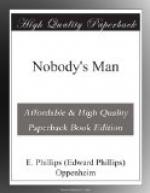“Greening,” he said, “if you are not in a hurry, could I have a word with you before lunch?”
“By all means,” the other replied. “We’ll go into the smoking room.”
They strolled off together, followed by more than one pair of curious eyes. An interview between the editor of the daily journal having the largest circulation in Great Britain and Tallente, possible dictator of a new party in politics, was not without its dramatic interest. Tallente wasted no words as soon as they had entered the smoking room and found it empty.
“Do you mind talking shop, Greening?” he asked. “I’ve been down to your place twice this morning, but couldn’t find you.”
“Go ahead,” the other invited. “I had to go round to Downing Street and then on to see the chief. Sorry you had a fruitless journey.”
“I will be quite frank with you,” Tallente went on. “What I am going to suggest to you is pure guesswork. A political opponent, if I can dignify the fellow with such a term, has in his possession an article of mine which I wrote some years ago, during the war. I have been given to understand that he means to obtain publication of it for the purpose of undermining my position with the Labour Party. Has he brought it to you?”
“He has,” Greening answered briefly.
“Are you going to use it?”
“We are. The article is in type now. It won’t be out for a day or two. When it does, we look upon it as the biggest political scoop of this decade.”
“I protest to you formally,” Tallente said, “against the publication by a respectable journal of a stolen document.”
Greening shook his head.
“Won’t do, Tallente,” he replied. “We have had a meeting and decided to publish. The best I can do for you is to promise that we will publish unabridged any comments you may have to make upon the matter, on the following day.”
“I have always understood that there is such a thing as a journalistic conscience,” Tallente persisted. “Can you tell me what possible justification you can find for making use of stolen material?”
“The journalistic conscience is permitted some latitude in these matters,” Greening answered drily. “We are not publishing for the sake of any pecuniary benefit or even for the kudos of a scoop. We are publishing because we want to do our best to drive you out from amongst the Democrats.”
“Did Horlock send Miller to you?” Tallente enquired.
Greening shook his head once more.
“I cannot answer that sort of question. I will say as much as this in our justification. We stand for sane politics and your defection from the ranks of sane politicians has been very seriously felt. We look upon this opportunity of weakening your present position with the Democratic Party as a matter of political necessity. Personally, I am very sorry, Tallente, to do an unfriendly action, but I can only say, like the school-master before he canes a refractory pupil, that it is for your own good.”




